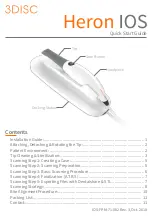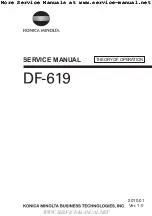
3.2
charging voltage test
3.2.1
this test enables the user to measure the output voltage of the alternator/regulator.
NOte: eNgiNe MUst be at NOrMal OPeratiNg teMPeratUre.
3.2.2
connect the testing clamps to the battery, as for the Battery load test (see section 3.1.2).
3.2.3
turn off all lights and accessories. operate the engine at a fast idle (approx. 1500rpm).
dO NOt
operate the test stArt switch.
3.2.4
read the digital display and compare results against expected results given in manufacturer’s handbook.
As a guide:
displayed voltage less than 13.5V
Insufficient voltage - check alternator.
displayed voltage between 13.5V and 15V oK.
displayed voltage greater than 15V
excessive voltage - check regulator.
3.3
starter Motor test
3.3.1
this test enables the user to identify excessive starter current draw.
NOte:
It is essential that the user performs the battery load test (see section 3.1) and proceeds to this test only if the battery is good.
eNgiNe MUst be at NOrMal OPeratiNg teMPeratUre.
3.3.2
connect the testing clamps to the battery (see section 3.1.2).
3.3.3
disable the ignition system so that the car will not start.
3.3.4
crank the engine and note the voltage reading during this operation.
3.3.5
A displayed voltage of less than 9 volts indicates excessive current draw, which may damage the battery.
excessive current draw in this situation could be caused by the following:
Bad connection.
failing starter motor.
Battery is insufficient for the vehicle’s requirements.
Please refer to vehicle manufacturer’s manual for further information/guidelines.
4. MaiNteNaNce
4.1
the Bt91d.V2 requires very little maintenance. Keep the case and display clean by wiping occasionally with a damp cloth - do not allow water to enter
the case and do not attempt to clean the unit with any form of solvent/abrasive.
4.2
remove any corrosion from the test clamps using a wire brush. rinse and dry thoroughly after such cleaning.
NOTE: It is our policy to continually improve products and as such we reserve the right to alter data, specifications and component parts without prior notice.
iMPOrtaNt:
no liability is accepted for incorrect use of this product.
warraNty:
Guarantee is 12 months from purchase date, proof of which will be required for any claim.
iNFOrMatiON:
for a copy of our latest catalogue and promotions call us on 01284 757525 and leave your full name and address, including postcode.
01284 757500
01284 703534
sole UK distributor, sealey group,
Kempson Way, suffolk Business Park
,
Bury st. edmunds, suffolk,
IP32 7Ar
www.sealey.co.uk
Web
Original Language Version
Bt91d.V2 Issue: 1 - 02/11/09
note:
If
•
either “er1” or "er2" are displayed, immediately disconnect the battery tester to prevent over load; the tester itself or it’s relay are defective.
cold temperature effects.
Because of the battery's chemical nature, it will test lower when cold than when warm. for most accurate results, this effect should be compensated for
when the battery's internal temperature is below 40°f (4.4°c). Assume internal battery temperature to be the days high / low average. see fig.2 below.
example: If rated capacity is 800ccA and internal temperature is approximately 35°f (1.7°c).
Assume test capacity to be 560ccA (560 = 800 x 70%).
560 = 800 (the ccA of the battery) x 70% (the rated capacity relating to the chart).
ºf
ºc
-20
-29
-10
-28
+10
-12
+20
-6.7
+30
-1.1
+40
+4.4
+50
+10
+60
+15.6
+70
+21.1
0
-18
20
30
40
50
60
70
80
90
100%
internal battery temperature
test at this percentage of rated capacity
Fig.2
load test result
battery condition
Good
(green led)
Battery capacity is oK (battery may or may not be fully charged). check specific gravity of battery
fluid to determine the charge state. If not fully charged, check for charging system fault (section 3.2) or
electrical drain.
Weak or Bad but display remains steady
(yellow or red led)
Battery capacity is not satisfactory. Battery may be defective or only partially charged. check specific gravity of
battery fluid to determine whether or not the battery is defective or merely requires charging.
should the battery prove defective, it must be replaced immediately.
Weak or Bad but displayed voltage is falling
(yellow or red led)
Battery may be defective or extremely run down. observe the digital readout - output recovery to 12V
or above within seconds of load test completion indicates a defective battery.
slow output recovery suggests that the battery is run down.




















